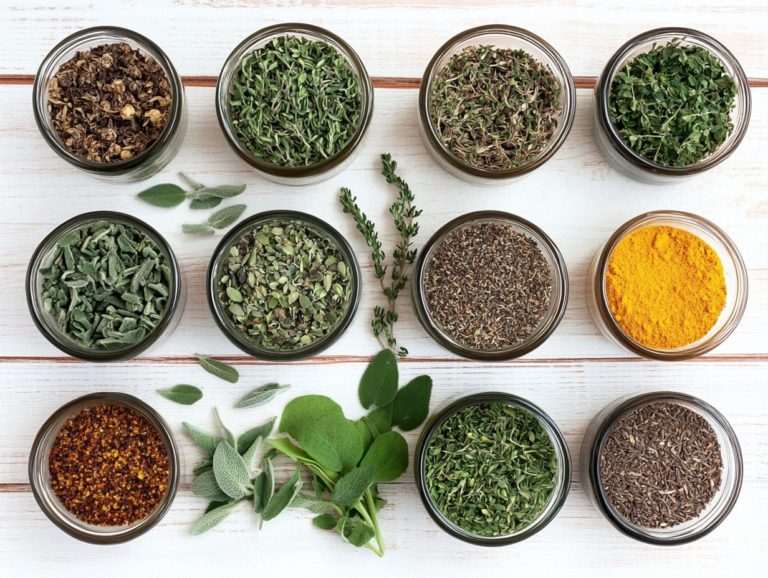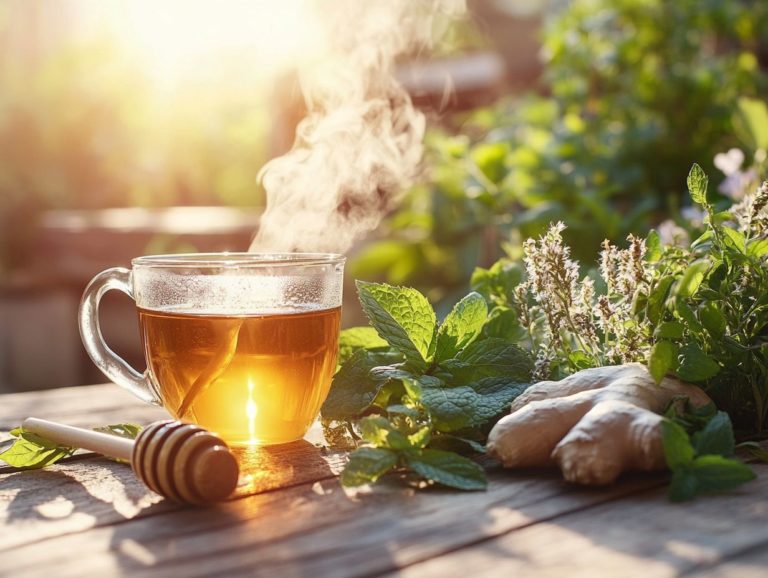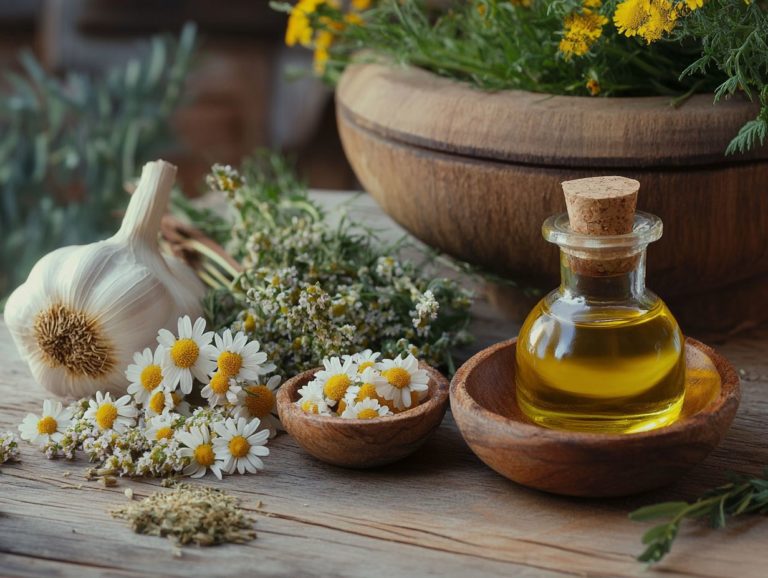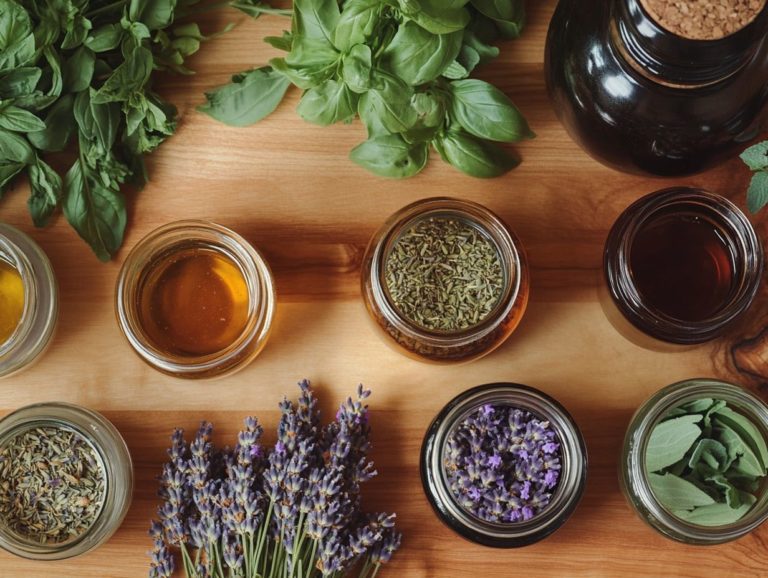Herbs for Reducing Menopausal Symptoms
Menopause is a profound transition in your life, often accompanied by a blend of physical and emotional changes. From hot flashes to mood swings, understanding these symptoms is essential for effective management. Many women are turning to natural remedies, particularly herbs, to ease discomfort.
Let s dive into the common symptoms of menopause and discover how herbs can help! This article highlights the benefits of herbs such as black cohosh and red clover and offers guidance on safely incorporating these remedies into your daily routine.
With a focus on wellness and empowerment, our goal is to help you navigate this phase with confidence.
Contents
- Key Takeaways:
- Understanding Menopause
- Recognizing the Symptoms of Menopause
- Herbs for Menopause Relief
- How to Incorporate Herbs into Your Routine
- Possible Side Effects and Interactions
- Frequently Asked Questions
- What are some popular herbs for reducing menopausal symptoms?
- How do these herbs help with menopausal symptoms?
- Are these herbs safe to use during menopause?
- Can these herbs be used in combination with hormone replacement therapy?
- Are there any side effects of using herbs for reducing menopausal symptoms?
- How should these herbs be taken for maximum effectiveness?
Key Takeaways:
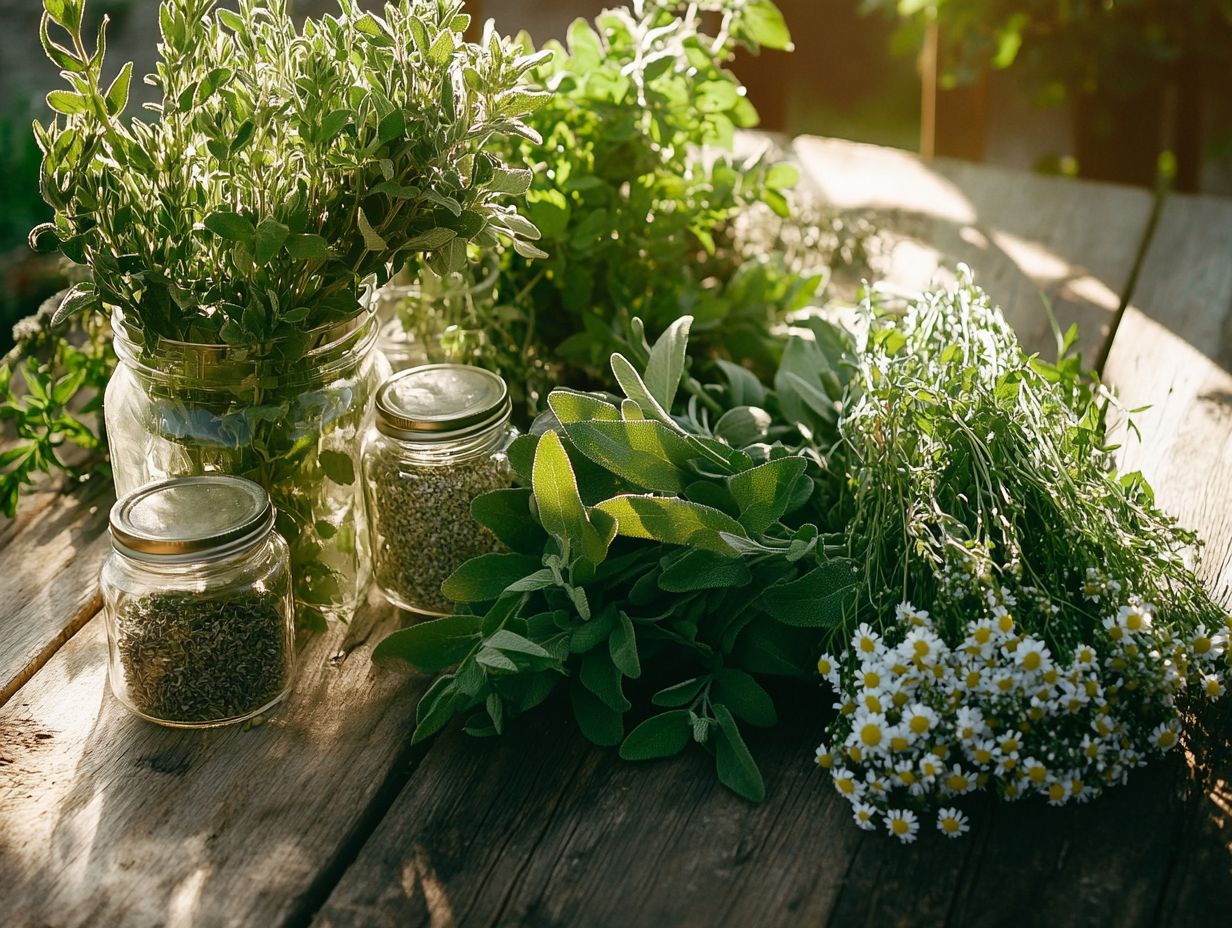
Menopause can bring on a variety of symptoms, including hot flashes, mood swings, and anxiety. Many women find that herbs like black cohosh, red clover, and dong quai help reduce these symptoms. For additional relief, exploring herbs for reducing headaches and migraines can be beneficial. It’s crucial to consult with a healthcare provider before incorporating herbs into your routine and to follow proper dosage and preparation methods.
Understanding Menopause
Menopause marks the end of menstrual cycles and involves a series of hormonal shifts that can significantly influence your overall quality of life. Typically occurring between the ages of 45 and 55, this biological process often brings a variety of symptoms like hot flushes, night sweats, mood fluctuations, and various physical and emotional challenges.
Understanding menopause is essential at this stage, as it highlights the importance of effective management strategies. This might involve making lifestyle adjustments and considering potential interventions with natural hormones those that are chemically identical to those your body makes to navigate this transition more smoothly.
What is Menopause?
Menopause is a natural biological transition that concludes your reproductive years, resulting from a reduction in estrogen and progesterone levels.
As ovarian function declines, you may experience significant hormonal fluctuations that lead to a range of symptoms. These changes often present as hot flashes, night sweats, and irregular menstrual cycles, creating discomfort and disrupting daily life.
The decrease in estrogen can also affect bone density, raising the risk of osteoporosis, while simultaneously influencing your mood and cognitive functions. By understanding these changes, you can pursue suitable treatments and lifestyle modifications to ease symptoms and enhance your overall well-being during this transformative phase of life.
Recognizing the Symptoms of Menopause
Women navigating the journey of menopause often face numerous symptoms that can significantly impact daily life. You might experience hot flushes, night sweats, mood swings, and various forms of sexual dysfunction.
Each person s experience is unique, and you may also contend with additional challenges like fatigue and insomnia. This emphasizes the importance of open conversations with healthcare providers to find effective management and relief strategies.
Hot Flashes and Night Sweats
Hot flashes and night sweats are among the most commonly reported symptoms of menopause, affecting countless women and often disrupting both sleep and daily life.
These uncomfortable episodes arise from hormonal fluctuations, especially the decline in estrogen levels, which throws the body’s temperature regulation into disarray. As estrogen levels decrease, the hypothalamus the body s thermostat becomes overly sensitive, triggering sudden waves of warmth and sweating. The effects can be profound, leading to irritability, lack of focus, and insomnia, all of which can impact personal and professional relationships.
You might find yourself exploring various management strategies for relief. Implementing lifestyle changes like maintaining a balanced diet, practicing relaxation techniques, and engaging in regular exercise can significantly ease these symptoms. Many women are turning to herbal remedies such as black cohosh and red clover for natural alternatives to hormonal therapies. If you’re curious, you can read more about whether herbal remedies can help with PMS symptoms.
Mood Swings and Anxiety

Mood swings and heightened anxiety are common experiences during menopause. These feelings often stem from significant hormonal changes that can lead to depression.
Fluctuations in hormones like estrogen and progesterone impact your physical health. They also profoundly affect your emotional well-being.
During this transitional phase, you may grapple with irritability, mood swings, or sudden waves of sadness. All of these can disrupt your daily life and relationships.
To help manage these symptoms, consider herbal treatments like black cohosh and red clover. These can provide natural relief as alternatives to traditional medications.
You can also consider additional treatments, like mindfulness practices and acupuncture, to restore your emotional balance. These strategies can help you navigate this turbulent time with greater ease.
Herbs for Menopause Relief
Herbs have been cherished for centuries across diverse cultures for their remarkable ability to ease menopausal symptoms. Many women find relief through herbal medicine and natural remedies, enhancing their quality of life during this significant transition.
Black Cohosh
Black cohosh stands out as a renowned herbal remedy for menopause. It is celebrated for its potential to ease hot flashes and support overall menopausal health.
This remarkable plant has been a staple in traditional medicine for centuries. It has often been lauded for its ability to relieve discomfort linked to hormonal fluctuations.
Recent studies have provided evidence of its effectiveness in enhancing emotional well-being and mitigating nighttime sweating. Be aware that some people might experience side effects, like gastrointestinal upset or headaches.
To seamlessly incorporate this herbal supplement into your wellness routine, consult with a healthcare professional. They can offer tailored guidance based on your unique health needs and appropriate dosages to optimize your well-being.
Red Clover
Red clover is an herbal remedy worth considering, as it s rich in plant-based compounds that mimic estrogen’s effects in your body.
This property can offer you potential relief from hot flashes, night sweats, and pesky mood swings. Traditionally, red clover has been employed in folk medicine to address various health issues, including using herbs for hormonal imbalance and cardiovascular health.
Recent studies have started to back its effectiveness in managing menopause symptoms, revealing promising results in reducing both the frequency and intensity of these challenging experiences. By embracing this natural approach, you might discover top herbs for hormonal health that support your well-being during this transitional phase.
Dong Quai
Dong quai, often dubbed the ‘female ginseng’, is a traditional herbal remedy lauded for its potential to balance hormones and ease menopause symptoms.
This esteemed plant boasts a rich history in ancient Chinese medicine, where it has been a trusted ally in supporting women’s health for centuries. Its natural properties are thought to help regulate your menstrual cycle and alleviate discomfort during menopause.
Many practitioners recommend pairing it with other herbs to amplify its effectiveness. As more women like you explore natural methods for managing menopause, incorporating dong quai into your wellness routine can offer a holistic path to achieving hormonal harmony and enhancing your overall well-being.
Explore these natural remedies today and find the relief you deserve during menopause!
Chasteberry

Chasteberry is renowned for its potential to support hormonal balance. It may be a promising ally in relieving various menopausal symptoms.
This remarkable herb has a rich history. It has been utilized for centuries in traditional medicine to help regulate menstrual cycles and ease discomfort linked to hormonal fluctuations.
Packed with compounds that interact with dopamine receptors areas in the brain that help regulate mood chasteberry may promote progesterone production while curbing excessive prolactin levels.
If you’re navigating menopause challenges like mood swings, hot flashes, and irregular periods, integrating chasteberry into your daily routine could offer a gentle, natural means of relief. For those interested in exploring additional options, consider the 5 herbs for balancing hormones. Whether you prefer capsules, tinctures, or teas, consult with your healthcare provider to find the most suitable method for your needs.
How to Incorporate Herbs into Your Routine
Incorporating herbal remedies into your routine can be an effective strategy for managing menopause symptoms. Understanding the proper dosage and preparation methods is crucial for achieving the best results.
Dosage and Preparation Methods
Determining the right dosage and mastering preparation methods are essential when utilizing herbal remedies for menopause relief. This ensures both effectiveness and safety.
Various forms of herbal remedies like capsules, teas, and tinctures each offer unique benefits and require specific dosages. Capsules provide a convenient option for precise measurements. Teas allow for gradual absorption while bringing a soothing ritual to your day. Tinctures offer a concentrated form of herbs that can be easily adjusted to meet your individual needs.
Follow safety guidelines and consult with health practitioners to identify appropriate dosages tailored to your unique health circumstances. This helps prevent any adverse effects that could stem from improper usage.
Possible Side Effects and Interactions
While numerous herbal therapies can relieve menopausal symptoms, it s essential to remain vigilant about potential side effects and interactions with other medications.
Understanding these factors can help you make informed choices for your health and well-being.
Consulting with a Healthcare Provider
Talking to your healthcare provider can make all the difference in personalized menopause management. This is especially important if you’re considering herbal remedies and their potential interactions.
Healthcare professionals can assess your individual health needs, evaluate any medications you’re currently taking, and identify any contraindications that might arise with herbal approaches. By discussing your treatment options openly, they can help you develop a tailored strategy that integrates both conventional treatments and alternative therapies.
This collaboration ensures your safety while maximizing the effectiveness of menopause symptom relief, addressing your unique concerns, whether they involve hot flashes or mood swings.
Ultimately, establishing a shared understanding enables you to navigate this transitional phase with confidence and care.
Frequently Asked Questions

What are some popular herbs for reducing menopausal symptoms?
Some popular herbs for reducing menopausal symptoms include black cohosh, red clover, dong quai, evening primrose, and ginseng.
How do these herbs help with menopausal symptoms?
These herbs contain plant compounds that mimic the effects of estrogen in the body. They help alleviate hot flashes, mood swings, and other symptoms of menopause.
Are these herbs safe to use during menopause?
For the most part, these herbs are considered safe to use during menopause. However, it is always best to consult with a healthcare professional before adding any new supplements to your routine.
Can these herbs be used in combination with hormone replacement therapy?
Yes, these herbs can be used with hormone replacement therapy. However, it is important to consult with your doctor to ensure there are no potential interactions.
Are there any side effects of using herbs for reducing menopausal symptoms?
Herbs are usually safe, but some may cause side effects like stomach upset or headaches. If you notice any negative reactions, stop using them immediately.
How should these herbs be taken for maximum effectiveness?
You can take these herbs in different ways, including capsules, teas, or liquid extracts. Always follow the dosage on the label or consult a healthcare professional for tailored advice.

